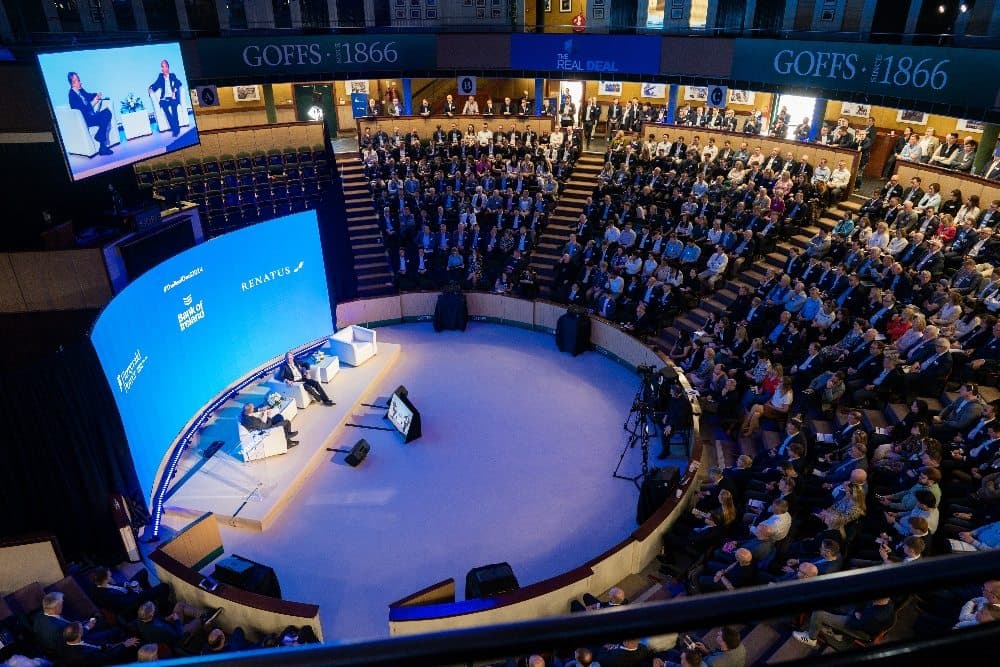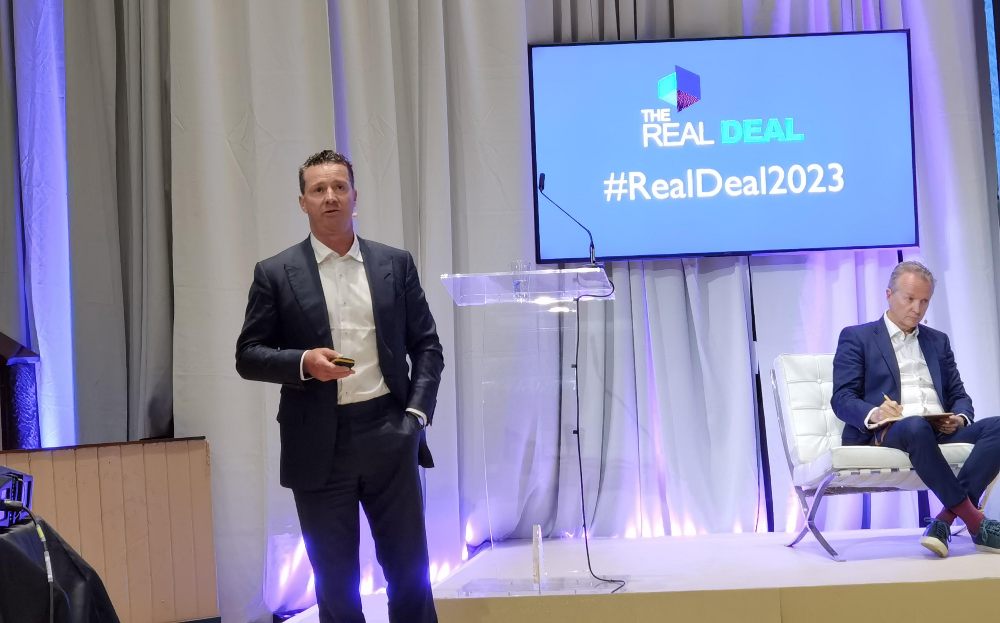Misconceptions over data centres and energy could cost Ireland the next wave of AI-focused tech investment and jobs, Niall Molloy told The Real Deal 2024.
“We could well miss out on what is the next huge wave of investments. And that is a real risk for Ireland,” Niall Molloy, CEO and co-founder of Echelon Data Centres, one of the largest data centre operators in Europe.
He warned that ongoing debate around data centres and electricity is dangerous and could cost Ireland in the long run, especially at the dawn of the AI age.
“There is a real danger with the next wave of development related to artificial intelligence that if we can’t tidy this up and come up with a clear path to how people can do data centres then we could well miss out on what is the next huge wave of investments. And that is a real risk for Ireland”
As well as being CEO and co-founder of Echelon Data Centres, Molloy is also a principal of Aldgate Developments. Echelon Data Centres has grown organically since 2017 to be one of the largest data centre platforms in Europe and one of Ireland’s fastest-growing businesses. Echelon recently closed a major funding partnership with Starwood Capital which involved the investment of $850m in equity and involves an enterprise value of over €2.5bn on the business.
He was speaking at The Real Deal 2024, which was organised by Renatus, Bank of Ireland and Fitzgerald Power and sponsored by LK Shields, The Currency, The Panel Interpath Advisory and Davy. The event saw leading figures in Ireland’s business world give fascinating accounts of their business careers and achievements to an audience of close to 1,100 people.
Making Ireland the digital hub of Europe
“Decarbonisation involves development of infrastructure, getting on with things and building things. You can’t talk your way into decarbonisation”
At the event Molloy related his tumultuous journey through a variety of recessions and pandemics to build up his data centre and property empire, which included the sale of two major office blocks in London for €1bn.
Molloy was quite clear that data centres are pivotal to future tech investments that will come to Ireland as the world embraces AI.
“I think we first of all need to understand what a data centre is. We provide the building, the power, the cooling, for the technology companies who can put their computers in the racks for the data processing. The processing requires large sources of power and power has become a very controversial issue given the demands globally, not just from data centres but for all sorts of industrial processes, cars, etc.”
Molloy said that Echelon has adopted a “power first” strategy for its data centres whereby it locates its operations at locations like Grangegorman or alongside the M50 in Dublin and in Arklow where it can guarantee large amounts of power for its data centres and its clients, which include digital giants like TikTok. Each building would typically use up to 30-megawatts and would cost up to €300m to build.
Echelon’s ambition is to build a data centre tapestry in Ireland that would require 500-megwatts and involve an investment of up to €5bn. He said Echelon hopes to build data centre infrastructure of up to 2,000-megawatts globally that will require a spend of €2bn.
The key to this will be a world class management team. “That’s the one thing we’ve worked very hard on over the last few years,” he said referring to the recruitment of notable executives like former HP Ireland chief Martin Murphy as chair.
Molloy said he almost fell into data centres accidentally, buying the land first and then finding a purpose for it. This included a former Eir data depot off the M50. He realised that in order to win business from clients like Microsoft multiple sites would be required.
The London real estate experience that Molloy had gained meant he became very adept at building high quality management teams and to succeed in data centres it meant hiring people skilled in technology, telecoms and electricity.
The strategy of acquiring locations that traditional data centre operators wouldn’t dream of buying eventually played into Echelon’s hands. “It took us until 2021 to get our first major occupier. But we could see the trajectory of power drying up, of the regulatory environment becoming more difficult and of the scale of these centres needing to be a lot larger.
“We obviously didn’t anticipate how bad the regulatory situation would become, but our bigbet was investing in energy centres and power stations on our sites that would be a key feature so we could provide power for those occupiers and the market would come to us over time.”
Misconceptions around modern data centres need to be cleared up
Molloy said that modern data centres actually resupply electricity to the grid. “The whole idea of modern data centres is that they need to tie into the grid to provide re-support. There’s a lot of negative narrative around data centres, but you need to be able to provide renewable energy.”
He added that conscious decisions are made to locate in economically deprived locations in order to bring employment opportunities, utilise renewable energy and provide re-support to the grid.
Molloy said that the future of data centres is engineering them to be as close to zero carbon as possible through the use of renewable energy sources, storage of power in batteries, use of biogas and to comply with stringent regulations. “We’re probably the first provider to be in a position to do that.”
An ongoing moratorium on data centres being built in Ireland due to concerns about how much energy these engine rooms of e-commerce consume is a growing cause of concern in terms of future investment.
Data centre providers such as Equinix have had to put expansion plans on ice, while leadership at giants like Amazon and Google have warned that the impasse could jeapardise future long-term investment into Ireland.
Molloy recalled how a recent visit to the US west coast to meet senior tech executives confirmed his fears. “We’re trying to attract them to Ireland. They are willing to come to Europe but are very nervous about it because the perception is that the regulatory regime may stop expanding here in due course because of the energy crisis. So I think it is something that is an issue for Ireland. I think it is important to try and clear up some of the narrative around data centres because it is an industry that doesn’t always help itself.
“The negativity: you’re breaking the grid, you’re taking the power … Well, any new connection to the grid has to be able to be capable of switching off the when the grid comes under constraint. There’s no way a new connection can break the grid. You have to be a net contributor and build energy centres and contribute back to the grid in terms of renewable energy.
“And, in terms of wind energy, these data centres are providing the business case for wind farms and renewables that otherwise might not get constructed. So, if you take those two things, grid security and renewables, we are therefore at the forefront of the harmonisation. Decarbonisation involves development of infrastructure, getting on with things and building things. You can’t talk your way into decarbonisation. If the industry can do that then it is a net positive.
“When people go for jobs in data centres, it is not just the construction and the operations jobs in those data centres, those companies that occupy them whether it is Microsoft, TikTok or Meta, these are huge employers, they are huge tax revenue generators.
“There is a real danger with the next wave of development related to artificial intelligence that if we can’t tidy this up and come up with a clear path to how people can do data centres then we could well miss out on what is the next huge wave of investments. And that is a real risk for Ireland.”
Main image at top: Broadcaster Matt Cooper talking with Niall Molloy at the recent Real Deal 2024 conference in Kildare
-
Bank of Ireland is welcoming new customers every day – funding investments, working capital and expansions across multiple sectors. To learn more, click here






